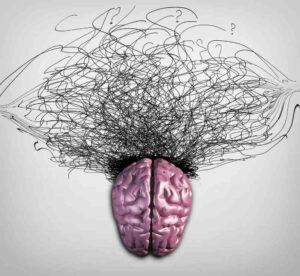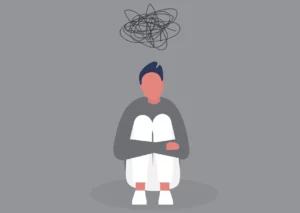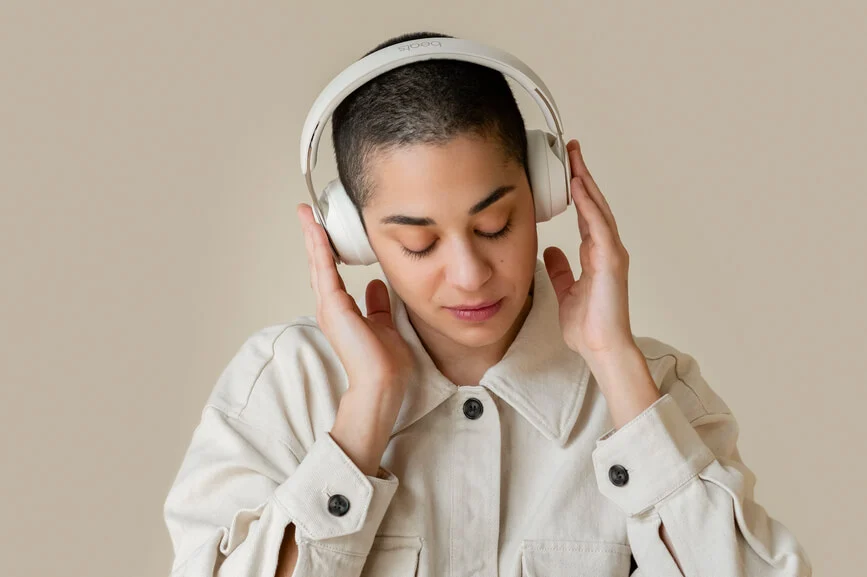Do you feel overwhelmed by all of the stimuli in your environment? Do you find it difficult to focus on one task at a time? If so, you may be experiencing overstimulation anxiety. This condition is characterized by an inability to tolerate stimulation from the environment. In this blog post, we will discuss what overstimulation anxiety is, and we will provide some tips for coping with it.
Contents
What Is Overstimulation Anxiety?
 Overstimulation anxiety is a type of anxiety that is characterized by feeling overwhelmed or overloaded by sensory input. This can include things like loud noises, bright lights, strong smells, and busy environments. People with overstimulation anxiety may feel like they are constantly on edge and unable to relax.
Overstimulation anxiety is a type of anxiety that is characterized by feeling overwhelmed or overloaded by sensory input. This can include things like loud noises, bright lights, strong smells, and busy environments. People with overstimulation anxiety may feel like they are constantly on edge and unable to relax.
This condition is often comorbid with other anxiety disorders, such as social anxiety disorder and generalized anxiety disorder. The reason could be that overstimulation anxiety can make it difficult to function in day-to-day life. For example, someone who is afraid of loud noises may have a hard time going to work or attending social events.
So it is important to reach out for help, overstimulation anxiety can be treated with therapy and medication. If you think you may be struggling with this condition, please reach out to a mental health professional for help.
What Are The Symptoms?
The symptoms of overstimulation anxiety can vary from person to person. However, there are some common symptoms that many people with this condition experience. These include:
Overwhelming
Sometimes, the feeling of anxiety can be so overwhelming that it feels impossible to cope. This can lead to a feeling of being trapped or helpless. For example, you may feel like you can’t leave the house or that you can’t go outside.
Racing Thoughts
Another common symptom of overstimulation anxiety is racing thoughts. This means that your mind is constantly thinking about things and it feels like you can’t turn off your thoughts. This can lead to difficulty concentrating and feeling very overwhelmed.
Restless
People with overstimulation anxiety often feel restless and unable to stay still for long periods of time. Restlessness is a common symptom of anxiety, but it can be especially pronounced in those who are overstimulated.
Irritability
This symptom can look different for everyone, but generally speaking, if you have overstimulation anxiety, you tend to be more easily irritated than usual. This can manifest as snapping at people more easily, feeling agitated, or even feeling like everything and everyone is just too much.
Anxious
Many people experience anxiousness in social situations, but for some, this feeling can be overwhelming and constant. For instance, those with overstimulation anxiety may feel constantly on edge, as if they are about to be overwhelmed by stimulation.
These symptoms can make it difficult to function in day-to-day life, as overstimulation anxiety can make it hard to concentrate or even leave the house. If you think you may be struggling with this type of anxiety, there are some things you can do to help cope. So do not get discouraged, you can manage this!
How Overstimulation Is Related To Anxiety?
 Overstimulation refers to a condition where someone is bombarded with too much sensory input. This can come from bright lights, loud noises, or even overwhelming smells. For people with anxiety, overstimulation can be a trigger that sets off a panic attack.
Overstimulation refers to a condition where someone is bombarded with too much sensory input. This can come from bright lights, loud noises, or even overwhelming smells. For people with anxiety, overstimulation can be a trigger that sets off a panic attack.
There is considered a link between overstimulation and anxiety because of the way the body reacts to both. When someone is anxious, their sympathetic nervous system is activated. This causes a fight-or-flight response, which can lead to an increase in heart rate and breathing. In some cases, it can also cause dizziness or shaking.
Meanwhile, overstimulation can cause a person to feel overwhelmed and dizzy. It can also lead to an increase in heart rate and blood pressure. In severe cases, it can cause a person to faint.
The similarity between the two reactions is why overstimulation is considered a trigger for anxiety. When the body is already in a state of anxiety, even small amounts of stimulation can cause a panic attack.
Therefore, it’s important for people with anxiety to avoid overstimulation. This can be difficult, especially in our modern world where we are constantly bombarded with sensory input. However, there are some coping mechanisms that can help.
Why Am I Easily Overstimulated?
Sometimes, people who are struggling with anxiety can find themselves feeling easily overstimulated. This means that they might feel like they’re constantly on edge and that even small things can feel overwhelming. So there are some triggers that can cause this feeling of being overstimulated.
Some common triggers for overstimulation anxiety include:
- Bright lights
- Loud noises
- Crowds
- Large gatherings
- Busy places
- Tight spaces
- Being touched unexpectedly
These are just some of the things that can trigger overstimulation anxiety in people. And it’s important to remember that everyone experiences anxiety differently, so not everyone will have the same triggers.
For example, there are other risk factors that can make someone more likely to experience overstimulation anxiety. This includes things like:
- Having a history of trauma or abuse
- Having another mental health condition like depression or OCD
- Experiencing chronic stress
- Taking certain medications
- Using substances like alcohol or drugs
As you can see, there are a lot of different things that can contribute to overstimulation anxiety. And it’s important to remember that everyone experiences anxiety differently, so not everyone will have the same symptoms or triggers. If you’re struggling with overstimulation anxiety, there are some things that you can do to cope.
How Does Overstimulation Anxiety Impacts Life?
 Well, for starters, it can be really tough to get a good night’s sleep when your brain is in overdrive. You might find yourself tossing and turning, or even waking up in the middle of the night unable to go back to sleep. This can lead to fatigue and a general feeling of being rundown.
Well, for starters, it can be really tough to get a good night’s sleep when your brain is in overdrive. You might find yourself tossing and turning, or even waking up in the middle of the night unable to go back to sleep. This can lead to fatigue and a general feeling of being rundown.
It can also be hard to focus on work or school when you’re constantly feeling anxious and on edge. You might find yourself struggling to concentrate or making more mistakes than usual. This can be frustrating and lead to even more anxiety.
In social situations, overstimulation anxiety can make it difficult to relax and enjoy yourself. You might feel like you’re always on guard, or that you have to be “on” all the time. This can lead to social isolation and feeling like you’re not really part of the group.
Overall, overstimulation anxiety can make life pretty tough. But there are things you can do to cope with it. You just need to be aware of what triggers your anxiety and find ways to manage it.
How Can I Calm Anxiety From Overstimulation?
While it may seem like there’s no way to calm down once anxiety from overstimulation has set in, there are actually a few things you can do to ease your symptoms. These are as follows:
Practice deep breathing
In overstimulation anxiety, it is common to start feeling short of breath. This is your body’s natural way of trying to calm itself down, but it can make you feel even more anxious. Instead of fighting the urge to take deep breaths, try to focus on taking slow, steady breaths in through your nose and out through your mouth.
Try progressive muscle relaxation
This is a relaxation technique that involves tensing and relaxing different muscle groups in the body. This can help to reduce anxiety by teaching the individual how to control their body’s response to stress.
Limit your screen time
It is important to take breaks from technology and give your mind a rest. One way to do this is by limiting your screen time. This means setting boundaries on how much time you spend on your phone, computer, or other electronic devices. Otherwise, you can become overstimulated by constant input and stimulation.
Find your safe space
 As stimulation increases, so does our anxiety. For some of us, this might mean feeling panicky in a crowded room or during a loud event. Others of us might feel anxious when faced with too many choices. So it is important to find a “safe space” – a place where we can go to reduce the amount of stimulation we’re experiencing. This might be a quiet room, nature, or even just spending some time outdoors.
As stimulation increases, so does our anxiety. For some of us, this might mean feeling panicky in a crowded room or during a loud event. Others of us might feel anxious when faced with too many choices. So it is important to find a “safe space” – a place where we can go to reduce the amount of stimulation we’re experiencing. This might be a quiet room, nature, or even just spending some time outdoors.
Listen to soothing music
Good music can help you to feel relaxed and can be a good distraction from your thoughts. There are many relaxation techniques that you can do with music, such as guided imagery or progressive muscle relaxation. So, if you are having a hard time dealing with your overstimulation anxiety, try listening to some calming music.
Set boundaries
It is important to set boundaries with yourself and others in order to avoid overstimulation. This means knowing your limits and being honest about what you can handle. If you’re feeling overwhelmed, say so. Don’t be afraid to ask for help or say no to plans. It’s also important to stick to a routine as much as possible.
Talk to someone
If you’re experiencing overstimulation anxiety, it’s important to talk to someone who understands what you’re going through. This could be a friend, family member, therapist, or other mental health professional. Talking to someone who gets it can help you feel less alone and more supported as you manage your symptoms.
Maintain healthy lifestyle
A healthy lifestyle is always a vital part of managing any anxiety disorder, and this is especially true when it comes to overstimulation anxiety. Be sure to get enough sleep, eat a balanced diet, and avoid drugs and alcohol. Exercise can also be helpful in reducing stress levels.
In addition to taking care of yourself physically, it’s important to nurture your mental health as well. Consider speaking to a therapist or counselor about your anxiety. Many people find that therapy is an extremely helpful tool in managing their anxiety.
Therefore, these are a few ways to cope with overstimulation anxiety. Remember that everyone experiences anxiety in different ways, so what works for one person may not work for another. The most important thing is to find what works for you and to keep working at it. Don’t give up!
Is Professional Help Needed?
 Usually, professional help is dependent on how much the anxiety is impacting your quality of life. If you are struggling to go about your day-to-day activities or if your anxiety is unmanageable, it might be time to seek professional help. A therapist could help you understand and manage your anxiety.
Usually, professional help is dependent on how much the anxiety is impacting your quality of life. If you are struggling to go about your day-to-day activities or if your anxiety is unmanageable, it might be time to seek professional help. A therapist could help you understand and manage your anxiety.
Cognitive behavioral therapy has been shown to be especially effective in treating overstimulation anxiety. This type of therapy can help you understand your thoughts and feelings and how they impact your behavior. It can also help you develop coping mechanisms to deal with anxiety-provoking situations.
If you think you might benefit from professional help, talk to your doctor or mental health professional. They can assess your symptoms and provide guidance on the best course of treatment. Remember, you don’t have to suffer from overstimulation anxiety alone. There is help available if you need it.
Conclusion
To wrap things up, overstimulation anxiety is a very real phenomenon that can have a significant impact on your life. If you think you might be suffering from it, there are steps you can take to help manage your symptoms and improve your quality of life. Talk to a professional about your concerns and ask for guidance on how to best cope with your specific situation.
In the meantime, take care of yourself, be patient, and remember that you are not alone.
If you are struggling then please contact Therapy Mantra for help. The team of experts here will be more than happy to help you out and get you on the path to a better life. Contact us today to learn more about our services. You can also book an online therapy session or download our free Android or iOS app.


